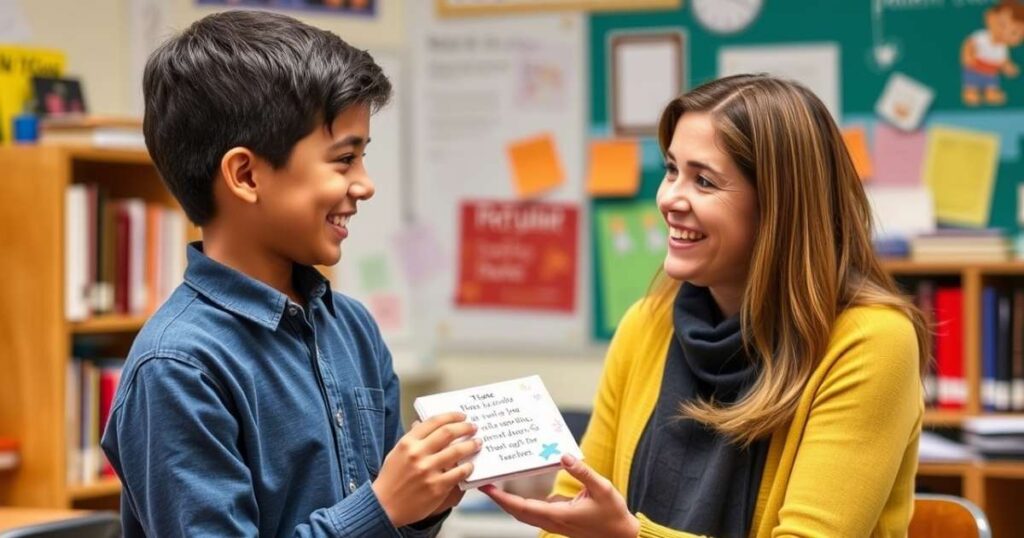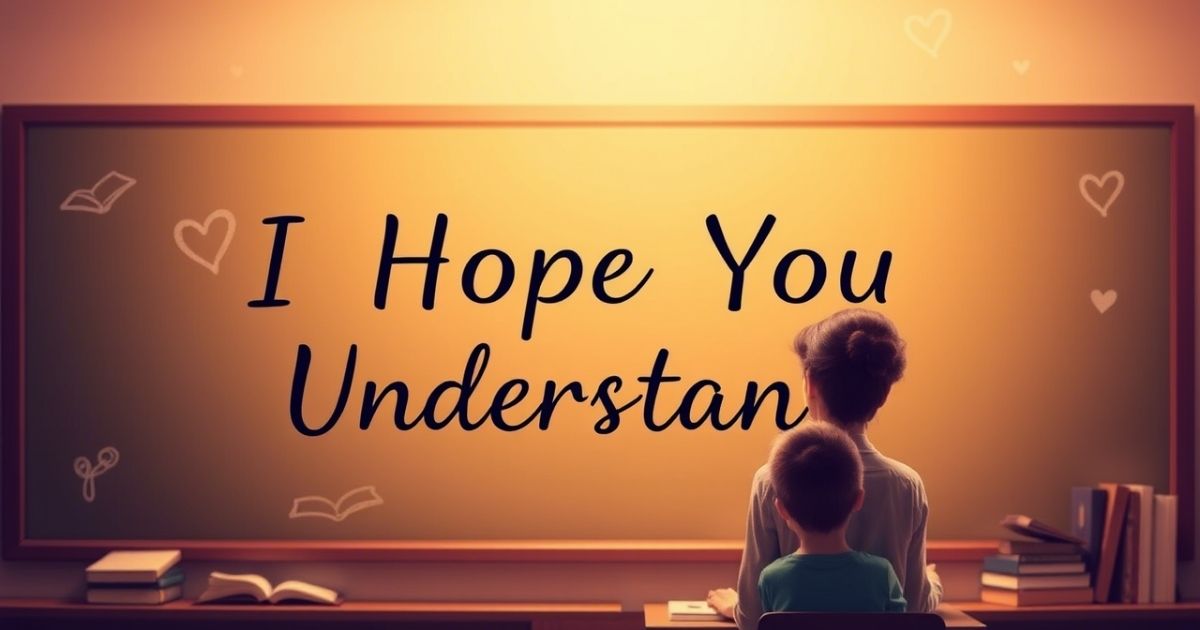I Hope You Understand is a phrase we use when we want someone to see our side. It shows we care and don’t want to hurt anyone. We often say it when we need patience, kindness, or support. It helps us explain without sounding rude or cold. People use it in texts, emails, or real talks. There are many ways to say this. Some use an I Hope You Understand synonym” to sound softer.
Others say “hoping for your understanding synonym” or “hope you understand synonym” to express the same feeling. You might also hear “I hope for your understanding” or I Hope You Understand other term” in place of the original phrase. No matter which version you choose, the meaning stays kind and respectful. These words help in hard moments. They build trust and open the way for honest talks.
Main Points
- Alternative phrases to express empathy and clarity in communication.
- Improve understanding with various ways to phrase your thoughts.
- Strengthen conversations with thoughtful and respectful expressions.
- Enhance emotional connections through effective communication.
- Avoid misunderstandings by using clear and considerate language.
I Trust This Makes Sense
Sometimes we explain things and say, “I Hope You Understand.” After that, we may add, “I Trust This Makes Sense.” It’s a polite way to make sure the message is clear. This phrase shows we tried to explain kindly and hope the other person understands.
“I Trust This Makes Sense” is used when giving details. You might use it in an email, text, or even in a meeting. It shows you care about the other person’s understanding. It’s I Hope You Understand a soft way to close your point without sounding too forceful or cold.
Using this phrase also shows respect. It gives space for questions while still being clear. People use it when explaining plans, decisions, or answers. When you’re not sure if your words are enough, say this. It keeps the tone gentle and helps others feel safe to ask more.
I Appreciate Your Patience

When things take time, we say, “I Hope You Understand.” We might also say, “I Appreciate Your Patience.” This shows we know someone is waiting or being calm. It’s a kind way to say thank you for not getting upset during a delay or mistake.
“I Appreciate Your Patience” is helpful in work and life. If you’re running late or fixing an issue, this phrase fits. It makes others feel seen and valued. Even small delays feel better when someone thanks you for waiting or staying calm during stress.
This phrase builds trust. People feel respected when their time and patience are noticed. It’s more than just words,it creates a better mood. Saying this helps both sides stay positive. Try using it when plans change, replies are late, or things don’t go as expected.
I Hope This Clarifies Things
When we say, “I Hope You Understand,” we’re trying to be clear and kind. To follow that, we often say, “I Hope This Clarifies Things.” This phrase helps others feel more confident about what was said. It shows we want to make things simple and easy to follow.
“I Hope This Clarifies Things” is often used after giving extra details. Maybe someone asked a question or felt confused. When we give a full answer and say this, it wraps things up nicely. It helps the other person feel heard and respected without pressure.
This phrase is gentle and thoughtful. It keeps conversations smooth and friendly. Instead of sounding like a lecture, it shows care. People use it in both personal and professional talks. When you’re unsure if your words were clear, add this to help remove doubts and invite more questions.
Thank You for Your Understanding
Sometimes, after we say Hope You Understand,” we follow with “Thank You for Your Understanding.” It’s a kind way to close a conversation, especially after sharing difficult news or asking for patience. These words express gratitude and show you truly value the other person’s support and calmness.
“Thank You for Your Understanding” is often used in emails or personal talks. If there’s a delay, change, or issue, this phrase fits well. It helps people feel acknowledged and respected. Saying thanks this way builds emotional trust and helps avoid tension or frustration on either side.
It’s not just polite,it’s powerful. These words soften the message and show emotional intelligence. Whether you’re speaking to a friend, a coworker, or a client, it makes a difference. Gratitude has a calming effect. Using this phrase keeps things peaceful, even when situations aren’t perfect.
I Value Your Perspective
After saying “I Hope You Understand,” it’s thoughtful to say “I Value Your Perspective.” This shows the conversation isn’t one-sided. It tells the other person that their opinion matters, even if you both see things differently. This kind of open talk helps build mutual respect and trust in relationships.
“I Value Your Perspective” is great during difficult discussions. It allows people to feel heard. Even if you don’t fully agree, you show that their voice counts. This phrase encourages open dialogue, mutual understanding, and active listening,all key parts of healthy, clear communication in life and work.
This I Hope You Understand phrase can reduce conflict. It builds a culture of respect, especially during disagreements. When people feel their views are respected, they listen better too. Saying this turns a hard talk into a chance for connection. It’s a small phrase with a big emotional impact in conversations.
I Hope You Can Relate
When we say something personal, we might follow with “I Hope You Understand.” But when we want deeper emotional connection, we often say, “I Hope You Can Relate.” It’s more than just understanding,it’s about shared experiences and feelings. It brings hearts closer, not just minds.
“I Hope You Can Relate” is used in emotional stories or honest moments. It shows you’re trying to connect, not just explain. It helps the other person feel included in your experience. This phrase invites empathy and builds a bond through similar life lessons or emotions.
This phrase also creates comfort. When people relate to each other, conversations become more real and meaningful. It opens space for supportive dialogue and shared growth. Whether you’re talking about struggles, joys, or lessons learned, these words make others feel seen, understood, and emotionally connected.
I’m Grateful for Your Support
When things get tough, saying Hope You Understand” followed by “I’m Grateful for Your Support” shows deep appreciation. These words are simple, but they hold so much meaning. They remind others that their kindness and presence matter, especially when you’re going through changes or facing challenges.
Support isn’t always loud or big,it can be quiet encouragement, kind words, or just listening. Expressing gratitude strengthens relationships. It lets others know their effort doesn’t go unnoticed. Whether it’s a friend, coworker, or loved one, saying you’re grateful can lift their spirits and bring you closer.
Gratitude builds emotional bonds. It makes people feel valued and respected. A sincere “I’m Grateful for Your Support” can turn a regular moment into something special. People want to be appreciated, and this simple phrase makes them feel seen, supported, and important in your life.
Related Guide:
Discover 11 Other Ways to Say “Thanks for Checking In”
I Hope This Resonates With You
When sharing thoughts or experiences, we often say, Hope You Understand.” But sometimes, “I Hope This Resonates With You” feels more personal. It means you’re hoping someone not only hears you, but also connects with what you’re saying. It’s about emotions, not just facts.
This phrase works well when sharing stories, lessons, or deep feelings. It invites empathy and connection. You’re not just speaking; you’re reaching out. Hoping it “resonates” means you care if the other person truly feels what you’re expressing. That care turns a message into a shared moment.
Using this phrase shows emotional intelligence. It brings people closer by highlighting shared values or feelings. It works in speeches, writing, or everyday talks. “I Hope This Resonates With You” reminds the listener that your words come from the heart,and you’re hoping they touch theirs too.
I Appreciate Your Consideration
After saying, “I Hope You Understand,” it’s kind to add “I Appreciate Your Consideration.” These words recognize that someone took time to listen or think about your needs. They’re not just being polite,they’re being thoughtful. And that deserves real appreciation, not just a quick thanks.
This phrase is often used when making requests, changes, or sharing concerns. It softens the message. People feel respected when their thoughts and feelings are acknowledged. Saying “I Appreciate Your Consideration” encourages mutual respect, especially in professional or sensitive conversations.
It’s a phrase that builds trust. People like to feel they matter, and these words do just that. Whether you’re asking for help, time, or patience, this expression shows emotional warmth. It makes people more willing to support you, simply because you’ve shown genuine gratitude and kindness.
I Hope You See My Viewpoint
When we say Hope You Understand,” we often mean “I Hope You See My Viewpoint.” It’s about sharing honestly while respecting the other person’s thoughts. This phrase shows we care about mutual understanding. It opens the door to communication without sounding pushy or defensive.
Sharing your viewpoint doesn’t mean forcing your opinion. It means showing where you’re coming from. When you invite someone to see your side, you’re building connection. This builds bridges, not walls. It creates space for honest communication, even during hard talks or disagreements.
When both sides feel heard, solutions come more easily. Saying “I Hope You See My Viewpoint” can lead to respectful dialogue and emotional connection. It’s a way to express your thoughts while still honoring the other person’s perspective. That’s how understanding begins and trust grows.
I Trust You’ll See My Side
We often say “I Hope You Understand,” but “I Trust You’ll See My Side” adds faith to the mix. It means you believe in the other person’s ability to listen with empathy. You’re not demanding agreement,you’re simply trusting them to hear you with an open heart.
Trust in communication is powerful. When you express your side with kindness, others are more willing to listen. This builds emotional intelligence and creates space for real conversation. “I Trust You’ll See My Side” reflects confidence in mutual respect and shared understanding.
Even during tough conversations, this phrase softens tension. It shows you’re not attacking, but opening up. That trust can lead to collaborative solutions and stronger connections. By using thoughtful words, you remind others that every voice, including yours, deserves to be heard and valued.
I’m Glad We Can Discuss This

Hope You Understand” often leads to open talk. That’s why we say, “I’m Glad We Can Discuss This.” It means you’re thankful for the chance to share and listen. It’s a phrase full of respect, empathy, and appreciation for dialogue without judgment or pressure.
When people are open to discussion, conflicts turn into opportunities. Differences don’t feel threatening,they feel valuable. Saying “I’m Glad We Can Discuss This” shows that communication matters to you. It reminds others that sharing ideas and feelings is something worth appreciating.
Good conversations aren’t about winning. They’re about connection. This phrase sets the tone for mutual understanding, honesty, and peace. It helps both sides feel safe, respected, and heard. With words like these, people are more likely to engage kindly, listen deeply, and respond with compassion.
I Hope You Can Empathize
When we say “I Hope You Understand,” we often mean “I Hope You Can Empathize.” It’s about hoping the other person can feel your emotions. Empathy is a powerful tool in communication. It creates deeper connections and opens the door to more compassionate conversations.
Empathy isn’t just about understanding words; it’s about understanding feelings. It means putting yourself in someone else’s shoes. Saying “I Hope You Can Empathize” shows you value emotional connection and wish to share your experiences. It’s a gentle way of asking for compassion, not just agreement.
When empathy is present, communication flows more smoothly. It removes judgment and allows for honest expression. By saying “I Hope You Can Empathize,” you encourage an open heart and a deeper connection, making it easier to resolve misunderstandings and build trust between people.
I Appreciate Your Willingness to Listen
Hope You Understand” reflects a desire for connection, but “I Appreciate Your Willingness to Listen” shows gratitude. It acknowledges that the other person is giving their time and attention. This appreciation helps create a positive atmosphere and fosters mutual respect during conversations.
Listening is more than hearing words,it’s about understanding the meaning behind them. When you say, “I Appreciate Your Willingness to Listen,” you recognize the effort others are making. It encourages more open and thoughtful discussions. This phrase shows that you value their input and are thankful for their patience.
Gratitude for listening can improve relationships. It encourages others to keep engaging with you in future conversations. A simple acknowledgment like this can strengthen bonds and make people feel heard. Saying “I Appreciate Your Willingness to Listen” reminds others that their attention is meaningful to you.
I Hope You Find This Helpful

We often say, “I Hope You Understand,” but “I Hope You Find This Helpful” is a way to offer support. It means you want to make sure the information or advice you’re sharing will be useful. This phrase reflects your desire to help and add value to someone’s experience.
Whether giving guidance or sharing resources, the goal is to make a positive impact. “I Hope You Find This Helpful” sets the stage for clear communication. It encourages the listener to absorb information in a way that benefits them. It also shows you’re invested in their success.
Offering help through communication builds trust. When people feel they’ve received something useful, they’re more likely to turn to you again. By saying, “I Hope You Find This Helpful,” you show that you genuinely care about the other person’s needs and well-being.
FAQ’s
What does “I Hope You Understand” mean?
Hope You Understand” expresses a desire for the other person to fully grasp your point of view. It indicates you care about clarity and mutual understanding.
When should I say “I Hope You Understand”?
Say Hope You Understand” when sharing something important, emotional, or complex. It shows you’re trying to make your message clear and inviting empathy from the listener.
Is there a similar phrase to “I Hope You Understand”?
A similar phrase to Hope You Understand” is “I Trust You’ll See My Side.” Both phrases reflect a desire for empathy, understanding, and mutual respect during communication.
Why is “I Hope You Understand” important in communication?
Hope You Understand” is important because it encourages clarity and empathy. It signals that you want the listener to truly grasp your feelings or point of view.
How can “I Hope You Understand” prevent misunderstandings?
Hope You Understand” prevents misunderstandings by inviting the listener to fully comprehend your message. It shows you care about their perspective.
Conclusion
I Hope You Understand is a phrase that expresses the desire for clear communication and mutual understanding. When you say this, you’re asking the other person to fully grasp your point of view. It’s an invitation for empathy and open dialogue.Using similar phrases like “hoping for your understanding” or “I hope for your understanding” can convey the same message.”Hope you understand” and “I trust you’ll see my side” are also good alternatives.
These phrases are helpful when you want to ensure that the other person not only hears you but understands your feelings or perspective. By using I Hope You Understand you’re promoting respectful communication and deeper connections. This phrase helps prevent misunderstandings and strengthens relationships by encouraging mutual respect and emotional connection. Effective communication is key, and these terms help create clarity and compassion.

Ember Rose is a dedicated administrator with 4 years of experience in efficient operations management and team leadership. Skilled in streamlining workflows and enhancing productivity.

